1,000 Number ones: A chart history
- Published
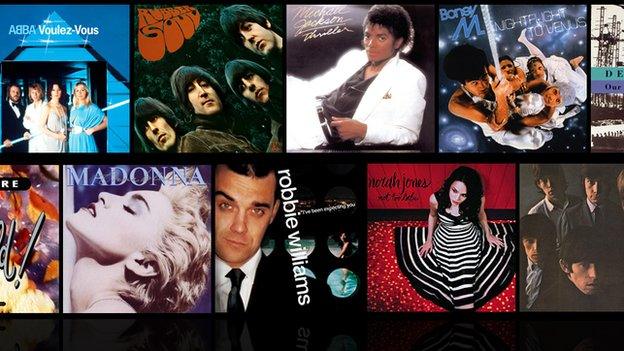
Just some of the 999 albums that have reached number one... so far
Last Sunday, Lady Gaga scored the 999th UK number one album, with her brazen pop opus ARTPOP.
But she was swiftly replaced by Robbie Williams - whose Swings Both Ways is his 11th chart-topper.
As the album chart celebrates its first millenium, we look at the records that paved the way, starting with the UK's first ever chart topper, in 1956.
First number one: Frank Sinatra - Songs For Swingin' Lovers (1956)
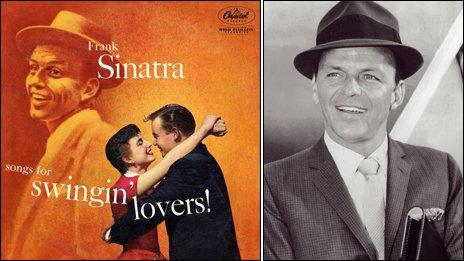
The first album chart was published in the Record Mirror in July 1956. It listed just five albums, and Frank Sinatra was leader of the (rat) pack.
Songs For Swingin' Lovers was his 10th solo album and is still, arguably, his greatest swing collection.
A challenge to the tide of rock and roll that was sweeping over America, it's a loose concept record about a man who leaves his lover and pursues a new romance.
Backed by Nelson Riddle's fresh, hip arrangements, Sinatra sounded on top of the world - delivering some of his best-known performances on You Make Me Feel So Young and I've Got You Under My Skin.
Given a perfect five-star review by Rolling Stone, it was the UK's number one for three weeks, and the fifth best-selling album of 1956 (number one was the soundtrack to Carousel).
But albums were still niche products. Only 12 million were sold in 1956 - compared to 100.5m in 2012.
100th number one: John Lennon - Imagine (1971)
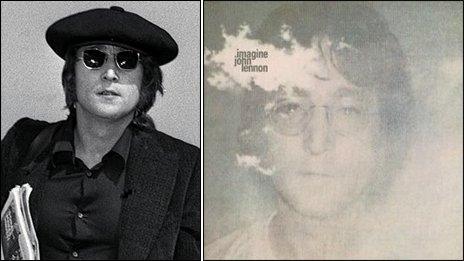
It took 15 years for the 100th number one to roll around - thanks mainly to The Beatles, who spent a combined three years in pole position.
But it was John Lennon who scored the chart centenary with his second solo album, Imagine.
A huge commercial success both in 1971 and immediately after his murder, it is less abrasive and more fondly remembered than his debut, Plastic Ono Band.
Every facet of his mercurial personality is on display: He's head-over-heels on Oh Yoko!; vulnerable on Jealous Guy; and venomous on How Do You Sleep? (a thinly-veiled character assassination of Paul McCartney).
But it is the optimistic, simple title track that endures. Lennon confessed it was "anti-religious, anti-nationalistic, anti-conventional [and] anti-capitalistic" but "because it is sugar-coated it is accepted".
"It was just what John believed," said Yoko Ono. "That we are all one country, one world, one people. He wanted to get that idea out."
200th number one: Boney M - Nightflight To Venus (1978)
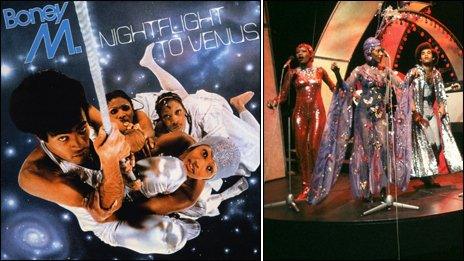
Released in July 1978, Boney M's Nightflight To Venus was the band's most successful record, clinging to the top spot for four weeks.
It contained several global hits, including Brown Girl In The Ring and Rivers Of Babylon - but not, strangely, that year's Christmas number one, Mary's Boy Child.
The band were the brainchild of German pop svengali Frank Farian (later responsible for Milli Vanilli), who reached a creative peak on this wilfully experimental third album.
The seven-minute title track was a freaky space odyssey, which envisaged an interstellar journey to a terraformed planet.
"It took almost 90 years to cool down the planet from its 500 degrees to the current pleasant 75 degrees, and to transform the atmosphere to make it inhabitable for Earth people," noted the narrator, over a pounding drum track based on Cozy Powell's hit Dance With The Devil.
It set the record up to be a space-age disco concept album, but the idea was immediately ditched on track two - Rasputin - a deranged ode to a 19th Century Russian mystic.
300th number one: Various - Now That's What I Call Music 3 (1984)
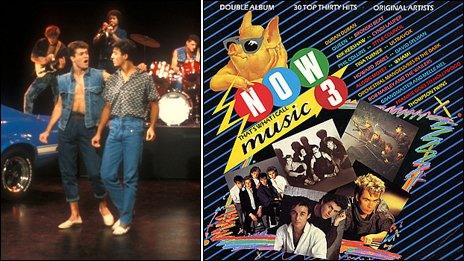
Compilation albums were included in the main countdown until 1989, and the Now... series regularly outsold all the competition.
The third instalment was released in July 1984 and contained four number one singles - including Wham's Wake Me Up Before You Go-Go and Duran Duran's The Reflex.
But the tracklisting also provides a few insights into the year's prevailing social issues. Special AKA's Nelson Mandela reflected the increasing disquiet over South Africa's apartheid laws, while Grandmaster Flash and Melle Mel delivered a funky anti-drugs message on White Lines (Don't Do It).
Other songs on the 30-strong tracklist included Queen's I Want To Break Free, Tina Turner's What's Love Got To Do With It and The Weather Girls' wedding disco staple It's Raining Men.
The sleeve starred the series' short-lived (and frankly unnecessary) porcine mascot, and exhorted fans to "complete your collection!" by purchasing the two preceding volumes, as well as their VHS and Betamax companions "for all you videoholics".
Thirty years later, and the series is thriving - Now 83 was the fastest-selling album of 2012.
But the most successful instalment was number 44, which kicked off with Britney Spears ...Baby, One More Time, and shifted a remarkable 2.3m copies in 1999.
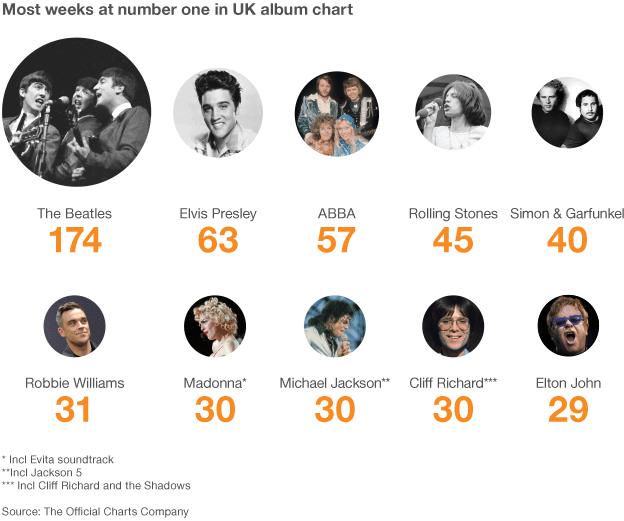
400th number one: Erasure - Wild! (1989)
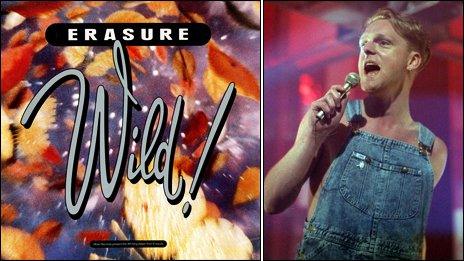
Selling 400,000 copies in just four days, Wild! was the second in a run of five consecutive number one albums for synthpop duo Erasure.
Despite the titular exclamation mark, it was their most mature record to date, opening with a sombre piano instrumental, and taking melodic flights of fancy on the hit single Blue Savannah.
At the time, frontman Andy Bell was one of the few openly gay pop stars and, while the record addressed gay themes (Drama! is about a "drama queen" who puts his friends through "one psychological drama after another"), the band were careful not to be too outrageous.
"If we did an openly gay video, it wouldn't get played on MTV," Bell told Australia's Countdown magazine in 1990.
"By approaching it the way we approach it - not being too aggressive or shouting at people, just showing them it's part of life but not the only thing in life - it's easy for people to deal with, and maybe there will be fewer people afraid to come out."
500th number one: Deacon Blue - Our Town (1994)
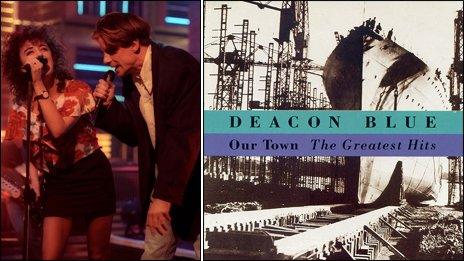
One in every 20 chart-toppers is a "best of" album - the first being The Best Of Ball, Barber & Bilk, - a 1962 collection of jazz standards by trumpeter Kenny Ball, trombone player Chris Barber and band leader Acker Bilk.
Deacon Blue's greatest hits reached number one in May 1994, featuring Scot-rock classics like Dignity, Real Gone Kid and their plaintive cover of Burt Bacharach's I'll Never Fall In Love Again.
The band had survived through sudden, head-turning success and the John-and-Yoko romance between frontman Ricky Ross fell and bandmate Lorraine McIntosh. ("Nobody in a band wants the backing singer going out with the lead singer," she admitted to Scotland's Daily Record, external last year).
But, three weeks after Our Town was released, Deacon Blue announced they were splitting up.
"As George Harrison once said, all things must pass," said Ross.
Now reformed, they released a new album, The Hipsters, in 2012.
600th number one: Robbie Williams - I've Been Expecting You (1998)
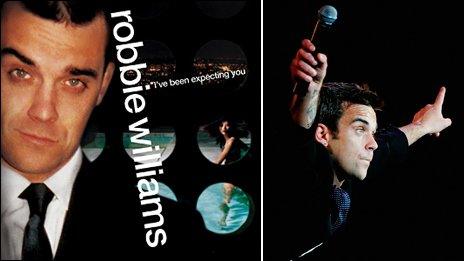
During the recording of I've Been Expecting You in spring 1998, producer Guy Chambers kept track of the work in -progress on a whiteboard, hung on the wall of Wheeler End studio in rural Buckinghamshire.
Scrawled along the top in black marker was the legend: "Robbie Williams' difficult second album (which isn't that difficult after all)."
"It's effortless, really," he told a documentary crew, external who turned up to film the sessions.
An ebullient victory lap after the success of Angels, the album's success was equally effortless - sailing to number one, going 10x platinum and selling more than three million copies.
Williams, at the peak of his fame, was so cocksure he could get away with self-aware lyrics like this, from Strong: "In the early morning when I wake up / I look like Kiss but without the make-up / And that's a good line to take it to the bridge."
Singles No Regrets and She's The One still form part of his live show today. The only real misfire was the leaden, James Bond-sampling Millennium - a cynical ploy for airplay as the year 2000 approached.
In total, Williams has scored 11 number ones - putting him on an even footing with Elvis.
700th number one: Coral - Magic and Medicine (2003)
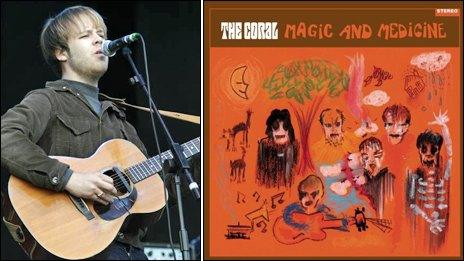
TV talent shows were hitting their stride in 2003, with Will Young, Gareth Gates, Girls Aloud and Liberty X all racking up the hits - but British indie was about to get a much-needed shot in the arm.
Liverpudlians The Coral were among the first out of the gates, blazing a trail for the likes of Franz Ferdinand, Snow Patrol, Keane and Razorlight.
The band had scored a minor hit the previous year with the jangly, Merseybeat throwback Dreaming Of You, and their second album cemented their success.
Praised by the NME for its "brutally concise and beautiful pop songs", it spawned the top 10 singles Don't Think You're The First and Pass It On.
But the band were taken aback by their swift rise.
"The smell of money's got into everyone," singer James Skelly told the Guardian, external. "Sony don't have any other good bands, there's just us, so everything's being put on us. I feel like apologising to people in a way, about how in your face everything is."
He needn't have worried. Their chart reign lasted a week, after which Robbie Williams' Escapology claimed the top spot.
800th number one: Norah Jones - Not Too Late (2007)
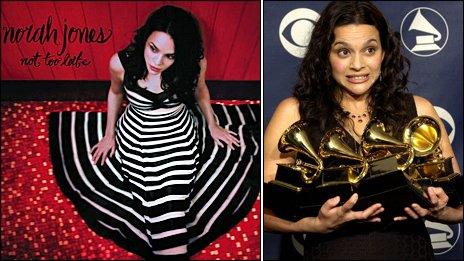
Norah Jones reached number one just three years after The Coral, a sign of the music industry's ever-decreasing attention span.
The constant churn at the top of the charts also coincided with a downturn in sales, which were sinking faster than a brick in a swimming pool - from 237m in 2004, to 128m in 2009.
The decline is neatly encapsulated by Norah Jones' triptych of number ones. Her debut, Come Away With Me, sold 2.4m copies in 2003. The follow-up, Feels Like Home, managed 900,000. Not Too Late, released in 2007, scraped in with sales of 100,000.
A deliberate step away from the coffeehouse jazz of her earlier records, it was also Jones's first collection of original material.
She made gentle stabs at politics - lamenting the re-election of President Bush in My Dear Country and portraying the US as a leaky boat in Sinkin' Soon - and, ultimately, the musical experimentation ensured her longevity.
"I don't expect to sell millions of records every time. I just don't think that's gonna be possible," she told CBS news, external.
"I feel like I've had my cake and I've eaten it and it tasted great. And I don't need another piece."
900th number one: Oasis - Time Flies (2010)
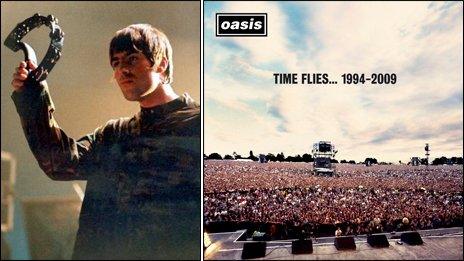
Oasis set a chart record in 1997 that still stands today, when their third album Be Here Now sold 660,000 copies in seven days - the highest-first week sales in history.
But, as songwriter Noel Gallagher freely admitted in the ensuing years, the bloated, cocaine-fuelled album was not his finest moment.
"Just because you sell lots of records, it doesn't mean to say you're any good," he noted. "Look at Phil Collins."
Time Flies was the band's swansong - a double disc anthology released the year after their acrimonious split backstage in Paris.
Over 27 tracks, it sketched how the band "dragged English guitar music out of the gutter" (Noel's words) with football terrace anthems like Wonderwall and Supersonic.
Oasis celebrate their 20th anniversary next year, but there is little hope of a reunion.
"I don't think there's any unfinished business," Noel said in an interview with Rolling Stone magazine, external this week. "I don't think that we left anything unsaid, do you know what I mean?"
1,000th number one: Robbie Williams - Swings Both Ways (2013)
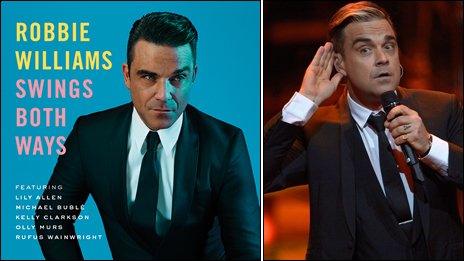
In a neat echo of Frank Sinatra's inaugural chart-topper, Robbie Williams' 1,000th number one is also a swing album.
Packed with razzamatazz renditions of standards like I Wanna Be Like You and Puttin On The Ritz, it easily outsold the competition, including teen troubador Jake Bugg and boyband JLS.
Swings Both Ways is Williams' second stab at the genre, and finds him in a relaxed, playful mood.
Among the covers are six original songs, including the pomposity-puncturing No-One Likes A Fat Pop Star ("When I get faint, I chew through my restraints / The best meal that I've had all week," he sings).
"I'm enjoying working and I couldn't come straight out with another pop album," Williams told Q Magazine.
"I wanted to do something else, and that something else shaped up to be a swing-style album."
The record is Williams' 11th number one - including two greatest hits - putting him on level pegging with Elvis.
Only Madonna (12) and The Beatles (15) have done better.
You can see details of all 1,000 UK number one albums on the Official Charts Company website, external.
- Published2 January 2013
- Published26 August 2013
- Published28 May 2013